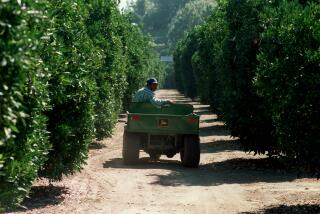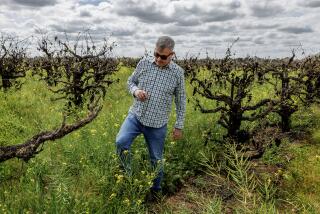Ventura County Lemon Growers Feel Squeeze From Argentina
Just below the Tropic of Capricorn in a flat expanse at the foot of the Andes Mountains lies something that keeps Ventura County lemon grower Bob Pinkerton up at night.
It’s Argentina’s Tucuman province--a fertile plain roughly the size of Connecticut that threatens to topple Ventura County from its perch as the world’s premier producer of the tart yellow fruit.
“There’s no doubt about it, these guys want to be the No. 1 lemon producers in the world, and they’re probably going to do it,” said Pinkerton, a member of the Saticoy Lemon Board. “They’re set up for serious business, and if this isn’t managed right, it’s going to hurt us in more ways than one.”
Beginning as early as next year, Argentina may start exporting lemons to the United States for the first time and step up production to take an even larger bite out of the world market with a product that almost matches Ventura County’s quality at a considerably lower price.
And although county growers are no strangers to competition, the size of Argentina’s lemon industry, its sophistication and rock-bottom production costs have people like Pinkerton worried they might be undercut. Because of lower wages, lower equipment costs, fewer government restrictions on the use of chemicals and less need for irrigation, production costs typically run about a quarter to a third of what they do here.
The impact, said industry experts, could be that some growers here scale back production and, in the worst cases, go out of business.
“It’s a whole different system down there, and there’s a lot working in [the Argentines’] favor,” said Rex Laird, executive director of the Ventura County Farm Bureau. “If we have to go head to head with them, it’s going to be pretty interesting. . . . Growers here are going to have to adapt, which is healthy, but the pace at which that has to happen could be costly.”
Of equal concern to many growers is the possibility that imported Argentine lemons may harbor voracious pests, such as the Mediterranean fruit fly, and diseases such as canker and black spot that could devastate the citrus crop throughout the county and state.
Growers want to make sure that if lemons are imported to the United States they meet rigid sanitary guidelines.
“Job one is to make sure that Argentine lemons meet our phytosanitary requirements,” said William Quarles, spokesman for the Sunkist cooperative, which markets fruit for more than 6,500 growers nationwide. “That’s the primary concern right now. The economic impact of their market entry, however, will follow.”
Argentina has had a problem with four particularly nasty pests over the years. If brought to the United States, they could do irreparable harm to the nation’s citrus industry.
In addition to medflies and canker, Argentine lemons have been found to carry black spot and sweet orange scab, fungal infections that disfigure the fruit, rendering it unmarketable.
*
“These are difficult pests to deal with, and once they’re in they are horribly expensive to eradicate,” Quarles said. “I don’t even want to imagine the kind of problems we’d be facing if any of these pests got a foothold in California.”
Since Argentina petitioned the United States in 1995 to allow growers there to begin exporting lemons, teams from the U.S. Department of Agriculture have been working with Argentine growers to ensure their products meet U.S. sanitary standards.
Earlier this year, the USDA filed a report that recommended allowing U.S. imports of some Argentine lemons, but a decision awaits a regulatory review.
Traditionally, Ventura County growers have had an advantage over growers elsewhere because of the area’s ideal climate, which allows them to grow lemons almost year-round, harvesting most of the crop in summer.
Other lemon-producing areas, such as the Imperial Valley and Arizona, can only harvest in winter, giving the county a near monopoly on the summer market.
However, the Tucuman Province--the world’s second-largest producer of lemons--has a climate almost identical to Ventura County’s.
It too can produce lemons year-round, with most production occurring during the austral winter, which coincides with Ventura County’s summer harvest.
With about 20,000 acres under cultivation, lemons are the county’s most profitable agricultural commodity, earning more than $217 million in 1997, as exports to Pacific Rim countries increased.
Domestic consumption also grew last year to a point where, according to the California Department of Food and Agriculture, $6 of every $10 worth of lemons sold in the state came from Ventura County.
*
Argentina increased in the last three years by 73%, 17% and 49%, Quarles said. Its main customers continue to be European countries--the Netherlands, England and Spain--but Argentina is also expected to make inroads into the lucrative Pacific markets.
With more than 80,000 acres under cultivation, more than California and Arizona combined, production in Argentina is expected to increase by about 4% this year.
Argentine growers have also begun experimenting with dwarf lemon trees to increase their per-acre yield.
“They’re already producing an incredible amount of lemons, and what happens when those get onto the market is what has so many people concerned,” said Alan Laird, deputy agricultural commissioner for Ventura County. “It’s the possibility of having a glut of lemons on the market that’s got growers worried.”
Despite the rapid growth of Argentina’s industry, domestic growers do enjoy a number of advantages that will make it difficult for the competition to gain a larger share of the market.
For one, most growers are affiliated with the Sunkist cooperative, which is recognized worldwide for its high quality.
Also, domestic growers can get their produce to market more quickly than the Argentines, giving consumers fresher, better-quality lemons.
“It’s not like [Ventura County growers] aren’t holding any cards,” said Laird of the agriculture commission. “They’ve got the markets and they’ve got the reputation, and it’s going to be an uphill battle for the Argentines to lay claim to that if that’s what they intend to do.”
*
Unlike other agricultural commodities, demand for lemons is only so large and will not expand as production increases.
To cope with this, area growers are hoping that agreements can be struck with Argentine competitors to manage the flow of lemons onto the market.
But that may be easier said than done, said Pierre Tada, president and chief executive of Limoneira Co. in Santa Paula, the largest farming operation in the county.
“I think the Argentine and California growers could potentially form an alliance where a better product gets to market at a better price, but there are a host of issues that need to be addressed first,” he said.
“It’s going to take an uncommon kind of leadership to form something like that and a sensitivity to the cross-cultural differences we both have.”
Quarles said Sunkist is prepared to “do anything and everything” necessary to protect the interests of its growers and would consider inviting Argentine growers into the cooperative to help manage world production.
“There’s still a long row to hoe before we get to that point, but this is something we are keeping on top of,” he said.
“At some point, however, I think we’ll have to come to some sort of an agreement.”
More to Read
Inside the business of entertainment
The Wide Shot brings you news, analysis and insights on everything from streaming wars to production — and what it all means for the future.
You may occasionally receive promotional content from the Los Angeles Times.










